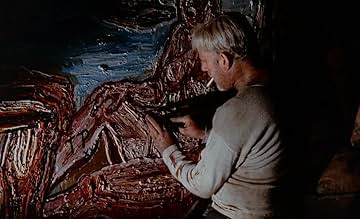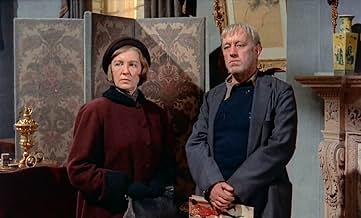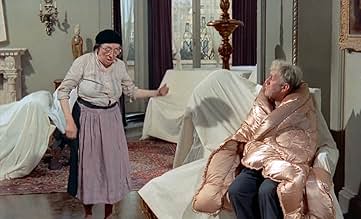IMDb-BEWERTUNG
6,9/10
4083
IHRE BEWERTUNG
Füge eine Handlung in deiner Sprache hinzuAn ill-behaved, lovably scruffy painter, Gulley Jimson, searches for a perfect canvas, determined to let nothing come between himself and the realization of his exalted vision.An ill-behaved, lovably scruffy painter, Gulley Jimson, searches for a perfect canvas, determined to let nothing come between himself and the realization of his exalted vision.An ill-behaved, lovably scruffy painter, Gulley Jimson, searches for a perfect canvas, determined to let nothing come between himself and the realization of his exalted vision.
- Für 1 Oscar nominiert
- 5 Gewinne & 6 Nominierungen insgesamt
Renee Houston
- Sara Monday
- (as Renée Houston)
John Adams
- Police Officer
- (Nicht genannt)
Chris Adcock
- Workman
- (Nicht genannt)
Andy Alston
- Workman
- (Nicht genannt)
Timothy Bateson
- Clerk to Borough Surveyor
- (Nicht genannt)
Victor Brooks
- Foreman
- (Nicht genannt)
Peter Bull
- Man in Taxi
- (Nicht genannt)
Empfohlene Bewertungen
One of the best movies about art ever made, `The Horse's Mouth' examines the relationships between vision and creation, between art and commerce, and most importantly between art and criticism; and makes us laugh at the same time. Alec Guinness is inspired (when was he ever not inspired, come to think of it) as Gully Jimson, a painter of unlimited ideas who has met with only limited success in the art marketplace partly because he is so contemptuous of that marketplace. His search for the perfect wall on which to paint, and the subject matter he ultimately winds up painting on one of the walls found in his search, is priceless. The Joyce Cary novel, and its companions in the Jimson trilogy (`Herself Surprised' and `To Be a Pilgrim') are well worth reading, but this movie is a very British, very engaging classic. In many ways, it's the movie that `Pollack' (good though it was) should have been.
Confession time, I first saw 'The Horse's Mouth' around ten or twelve years ago, one afternoon on British television and hated it. Alec's "Gulley Jimson" seemed to me to be very un-likable and I found myself unable to get the point of the film. However, re-watching this on DVD, I found it to be far, far better than I remembered and something of a revelation.
I found myself identifying with "Gulley" this time around and appreciating Alec's subtle performance (to the extent that I was genuinely sad to see the film end). Guinness is backed by two astonishingly fine performances by Walsh and Houston (it's Rene's finest performance, for someone with a tendency to play 'broad' here she is remarkably subtle).
All in all, a wonderful if sadly under-rated film and one equal to Alec's best Ealing work.
I found myself identifying with "Gulley" this time around and appreciating Alec's subtle performance (to the extent that I was genuinely sad to see the film end). Guinness is backed by two astonishingly fine performances by Walsh and Houston (it's Rene's finest performance, for someone with a tendency to play 'broad' here she is remarkably subtle).
All in all, a wonderful if sadly under-rated film and one equal to Alec's best Ealing work.
This is probably my favorite movie. It may be overstatement to call a mere British comedy a timeless classic, but this outstanding movie, beneath its raucously madcap surface, has some very serious things to say about what it means to be an artist, to be driven by visions while living in a society that doesn't care. I think Guinness is the greatest actor of the century, and that his performance here as the maddening, irascible, impossible Gulley Jimson is the zenith of his movie roles. Kay Walsh, who partnered with Sir Alec in Tunes of Glory, is equally brilliant.
Having said that, I recently read Joyce Cary's novel, on which the movie is based, and I have to say that the book is much darker than the movie, which plays up the darkly comic scenes of the novel while diminishing - or even omitting - some of the darker moments. Still, the movie stands well on its own, even if it is a somewhat different entity than the book.
Having said that, I recently read Joyce Cary's novel, on which the movie is based, and I have to say that the book is much darker than the movie, which plays up the darkly comic scenes of the novel while diminishing - or even omitting - some of the darker moments. Still, the movie stands well on its own, even if it is a somewhat different entity than the book.
My late wife, an artist, loved this film, and it gave me such insights into the way her mind worked. Guiness is wonderful; for once we see many levels of the character he portrays. Kay Walsh is so touching as the woman in his life, while Mike Morgan makes the perfect art groupie. It's funny to see Dr. Pastorious in old age; he has barely changed since Bride of Frankenstein.
The humor is gentle and quiet except for the studio renovation scene, but it is when Gully stands in front of a canvas that the truth of this film comes out. His almost soliloquy on the human foot; the scene where he shrugs and says that was not what he was trying to say, after he has ruined the toff's wall, these are priceless and our entry into an artist's mind. When the houseboat sets sail down the Thames, to the comment about the sea by the looney who pipes Gully aboard is a bit of perfection set on celluloid. He stands there, framing a vision of another canvas on the hull of a freighter, while reciting this wonderful doggerel that I always get mixed up when I try to say it, and all the while Nosey and Sara spur him on. I've never read the book and wonder if this represents his death, but I take from it what I will.
One other thought: there are certain films shot on location that should be filed away as time/place documentaries. This one is a perfect example: London 1958.
The humor is gentle and quiet except for the studio renovation scene, but it is when Gully stands in front of a canvas that the truth of this film comes out. His almost soliloquy on the human foot; the scene where he shrugs and says that was not what he was trying to say, after he has ruined the toff's wall, these are priceless and our entry into an artist's mind. When the houseboat sets sail down the Thames, to the comment about the sea by the looney who pipes Gully aboard is a bit of perfection set on celluloid. He stands there, framing a vision of another canvas on the hull of a freighter, while reciting this wonderful doggerel that I always get mixed up when I try to say it, and all the while Nosey and Sara spur him on. I've never read the book and wonder if this represents his death, but I take from it what I will.
One other thought: there are certain films shot on location that should be filed away as time/place documentaries. This one is a perfect example: London 1958.
"Horse's Mouth" certainly stands up well in it's advanced age; at 45 years old it has remained as timeless as any of the great comedic films.
One IMDb writer has tagged Gully as a "vulgar" painter, which goes to show that the sensitivities this film violated are still around. Pinching your loving ex's bum and tickling the rich lady's knee (shades of Groucho), though, are pretty tame today.
Gully Jimson is a rich character, Chaplin-like, who single-mindedly pursues painting while disillusioning aspiring young Nosey about the artist's life. All growled on tiptoes by one of film's classic great actors.
Jimson is a man who's given up all else, including health, wealth, conventional relationships, to live in a leaky houseboat with a vision. But as the story develops it, like all great literature, manages to puncture almost all of life's rationalizing balloons. Jimson is valorized as is Don Quixote, without suggesting that his hero's journey is a painless one.
All is set in a colorful environment with a delightful if conventionally unpolished cast, all the improbably gleeful turns that make the Marx movies so delightful, and a director who contrives seamlessly with Guiness to create a clever and hilarious marvel that can be enjoyed over and over.
Heck yeah, there's even a chase scene! And pull your socks up!
The DVD version includes a short by Pennebaker that feels as fresh and contemporary, accompanied by a Duke Ellington tune, which played along with "Horse's" original release.
One IMDb writer has tagged Gully as a "vulgar" painter, which goes to show that the sensitivities this film violated are still around. Pinching your loving ex's bum and tickling the rich lady's knee (shades of Groucho), though, are pretty tame today.
Gully Jimson is a rich character, Chaplin-like, who single-mindedly pursues painting while disillusioning aspiring young Nosey about the artist's life. All growled on tiptoes by one of film's classic great actors.
Jimson is a man who's given up all else, including health, wealth, conventional relationships, to live in a leaky houseboat with a vision. But as the story develops it, like all great literature, manages to puncture almost all of life's rationalizing balloons. Jimson is valorized as is Don Quixote, without suggesting that his hero's journey is a painless one.
All is set in a colorful environment with a delightful if conventionally unpolished cast, all the improbably gleeful turns that make the Marx movies so delightful, and a director who contrives seamlessly with Guiness to create a clever and hilarious marvel that can be enjoyed over and over.
Heck yeah, there's even a chase scene! And pull your socks up!
The DVD version includes a short by Pennebaker that feels as fresh and contemporary, accompanied by a Duke Ellington tune, which played along with "Horse's" original release.
Wusstest du schon
- WissenswertesWhen Nosey offers Bisson a bowl of stew, Michael Gough's voice on the soundtrack says "Buzz off!" but his lips form the words "Drop dead!" Presumably the line was changed when Mike Morgan died suddenly before the movie was released.
- PatzerWhen Nosey tries to feed Lolley while she's posing nude for Abel's sculpture, it's briefly revealed that the actress is in fact wearing a top.
- Zitate
Gulley Jimson: Go and do something sensible, like shooting yourself! But don't be an artist!
- SoundtracksLieutenant Kijé Op. 60
Written by Sergei Prokofiev (as Prokofieff)
Arranged by Kenneth V. Jones
Conducted by Muir Mathieson
Top-Auswahl
Melde dich zum Bewerten an und greife auf die Watchlist für personalisierte Empfehlungen zu.
- How long is The Horse's Mouth?Powered by Alexa
Details
- Erscheinungsdatum
- Herkunftsland
- Offizieller Standort
- Sprachen
- Auch bekannt als
- The Horse's Mouth
- Drehorte
- Wormwood Scrubs Prison, Du Cane Road, East Acton, London, England, Vereinigtes Königreich(exteriors Gulley Jimson leaving prison)
- Produktionsfirma
- Weitere beteiligte Unternehmen bei IMDbPro anzeigen
- Laufzeit
- 1 Std. 37 Min.(97 min)
- Farbe
- Seitenverhältnis
- 1.66 : 1
Zu dieser Seite beitragen
Bearbeitung vorschlagen oder fehlenden Inhalt hinzufügen


































